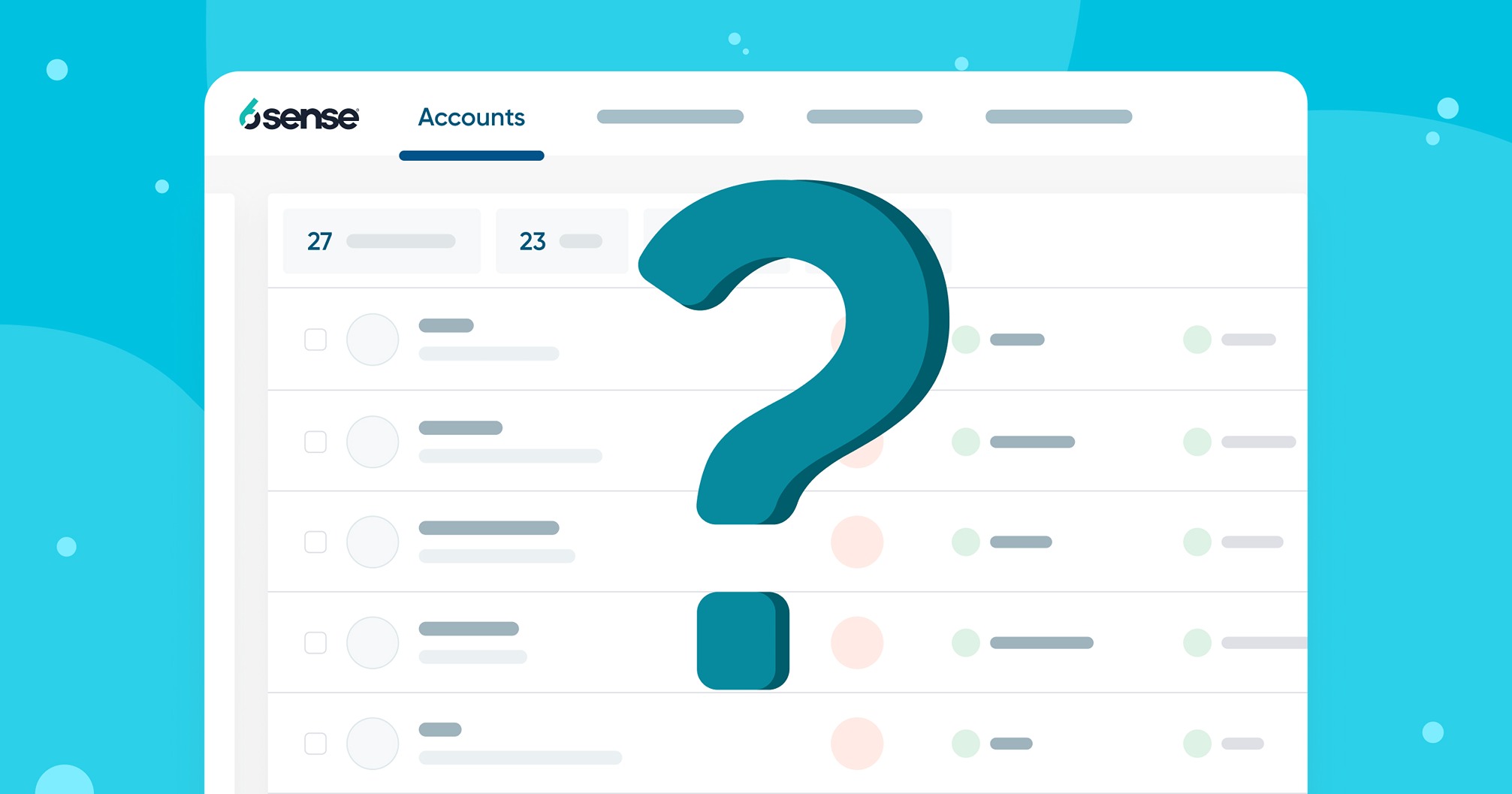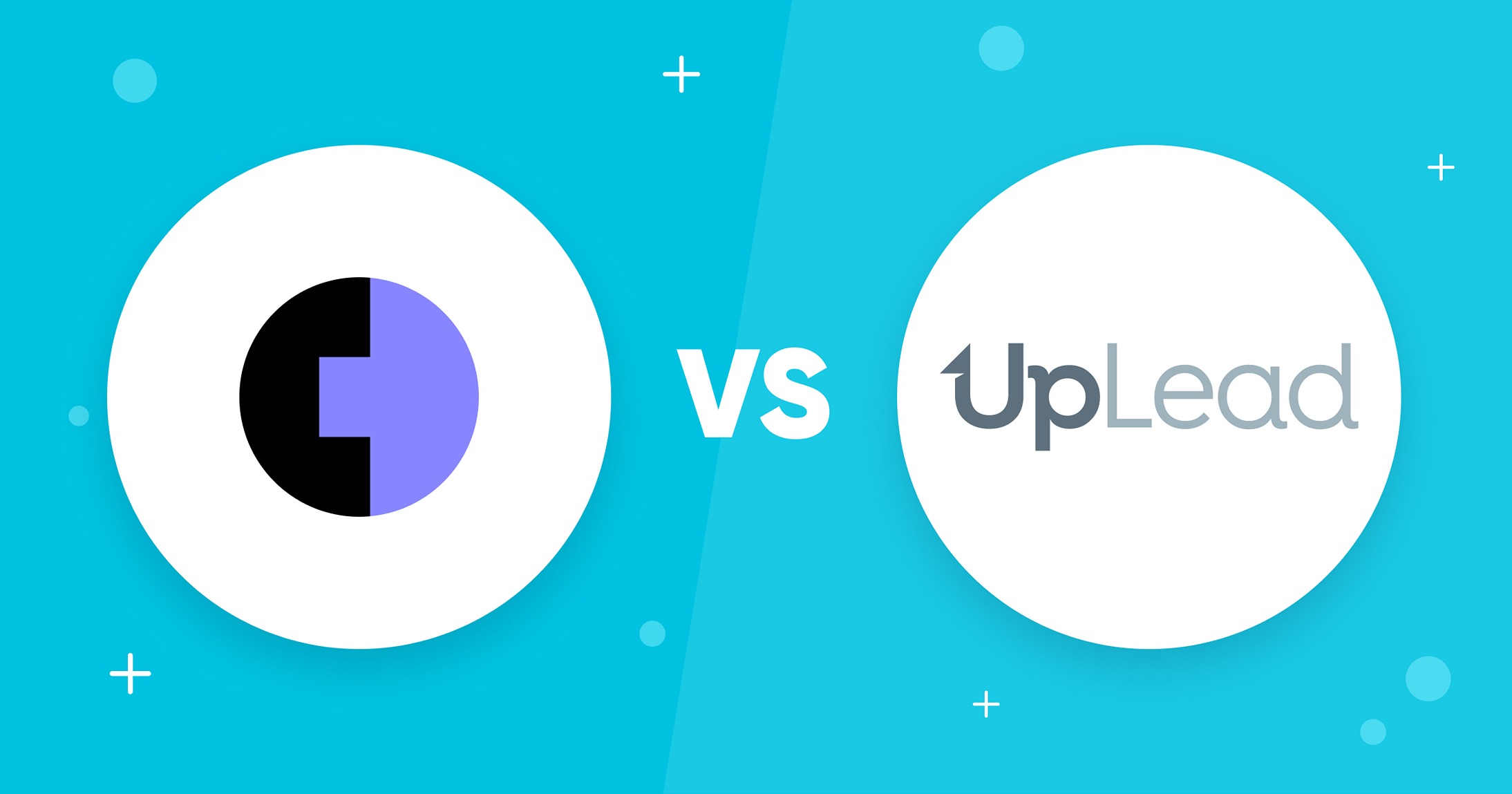This article covers 14 B2B data providers to skyrocket your outreach. These lead generation tools will allow you to put together targeted prospect lists. They offer large contact databases and several features to help you find the best quality leads.
We’ll also discuss choosing your team’s best B2B data provider, considering the following criteria: database size and quality, usability, and budget.
Let’s get started.
What is a B2B Data Provider?
A B2B data provider is a company that offers customers access to a business information database. This includes data about employees, decision-makers, and about companies. Examples of data found in a B2B database include:
- Business email addresses
- Mobile phone numbers
- Direct dials
- Employee/decision-maker demographics
- Firmographics
- Technographics
Businesses use a B2B data provider for sales and marketing purposes. It provides business intelligence that informs sales and marketing teams on who they should target in their campaigns. It also informs you about how to target these prospects best.
For example, a B2B data provider can help your sales team uncover businesses that use one of your competitor’s software. It can also tell you the organizational structure and who the key decision-makers are. It’ll give you their business email address, phone number, and direct dial.
Your sales team can perform outreach with this information, potentially adding a new customer and generating more revenue.
14 Best B2B Data Providers in 2024
We’ve tested the 14 best B2B data providers and analyzed them using public review data from G2 and Capterra:
| Name | Total Score | G2 Rating | # of G2 Reviews | Capterra Rating | # of Capterra Reviews |
| UpLead | 4.7 | 4.8/5 ⭐ | 759 | 4.6/5 ⭐ | 76 |
| Voila Norbert | 4.6 | 4.7/5 ⭐ | 61 | 4.5/5 ⭐ | 22 |
| Apollo | 4.6 | 4.8/5 ⭐ | 6.994 | 4.6/5 ⭐ | 344 |
| Cognism | 4.6 | 4.6/5 ⭐ | 688 | 4.6/5 ⭐ | 125 |
| Lead411 | 4.5 | 4.5/5 ⭐ | 464 | 4.7/5 ⭐ | 61 |
| Rocketreach | 4.5 | 4.5/ 5 ⭐ | 755 | 4.2/5 ⭐ | 131 |
| Clearbit | 4.4 | 4.4/5 ⭐ | 624 | 4.5/5 ⭐ | 33 |
| LinkedIn Sales Navigator | 4.3 | 4.3/5 ⭐ | 1902 | 4.5/5 ⭐ | 146 |
| Lead Genius | 4.2 | 4.3/5 ⭐ | 14 | 4/5 ⭐ | 3 |
| ZoomInfo | 4.1 | 4.4/ 5 ⭐ | 8.439 | 4.1/5 ⭐ | 286 |
| Lusha | 4.0 | 4.3/ 5 ⭐ | 1.464 | 4.0/5 ⭐ | 363 |
| Seamless AI | 3.7 | 4.3/ 5 ⭐ | 2.675 | 3.7/5 ⭐ | 149 |
| DiscoverOrg | – | 4.1/5 ⭐ | 61 | – | – |
| Adapt | – | 4.6/5 ⭐ | 2773 | – | – |
We’ve calculated the total score based on this calculation:
Total score = (G2 rating * # of G2 reviews) + (Capterra rating + # of Capterra reviews) / (# of G2 reviews + # of Capterra reviews)
We’ve excluded tools from our rating that haven’t had reviews from both platforms.
Now, let’s check out the best marketing data providers in detail.
UpLead
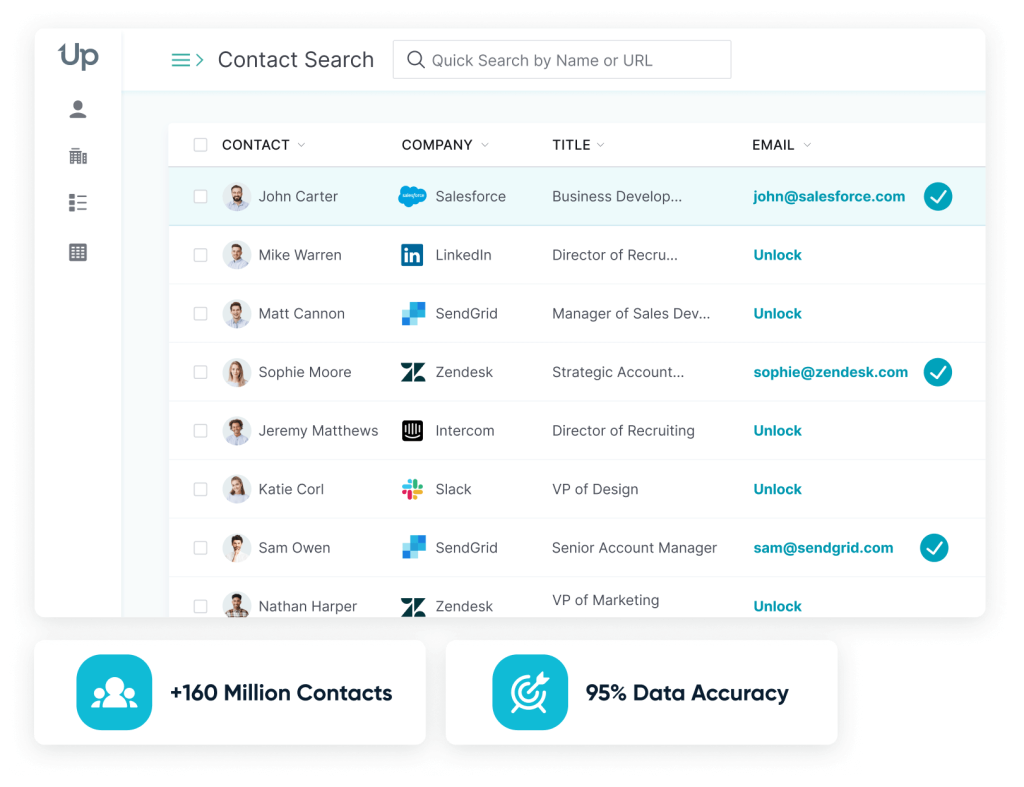
UpLead is a B2B lead generation tool that gives you access to one of the most accurate contact databases. Your sales and marketing teams can sift through the database, using 50+ search criteria filters to build targeted prospect lists.
Because UpLead is affordable and has a high-quality database, it’s ideal for businesses of all sizes and industries. The database has 160+ million B2B email addresses from 200+ countries. It also features 16+ million global company profiles and guarantees 95% data accuracy.
UpLead’s major selling points are its affordable pricing plans, robust features, and high-quality database. The one drawback is that there’s no mobile app.
Key Features:
- 160+ million B2B email addresses from 200+ countries
- 95% data accuracy guarantee
- 16+ million global company profiles
- 16,000+ technologies tracked
- Targeted prospect lists
- 50+ search criteria filters
- Real-time email verification
- Data Enrichment
- CRM integration
- Google Chrome extension for LinkedIn and website data scraping
- Technology tracking
- Organizational charts
- Competitor intelligence
- Real-time intent data
Pros:
- Very high database accuracy
- Extremely affordable compared to alternative tools
- Real-time email verification
- Purchase intent data from Bombora
Cons:
- Lacks a mobile app
Pricing
- Free trial: $0 with 5 credits
- Basic: $99/month with 170 credits
- Plus: $199/month with 400 credits
- Professional: Custom
Reviews
Capterra: 4.6/5 ⭐ (76 reviews)
G2: 4.7/5 ⭐ (759 reviews)
Lead generation doesn’t have to be all that painful. With UpLead, you can easily connect with high-quality prospects and leads to grow your company.
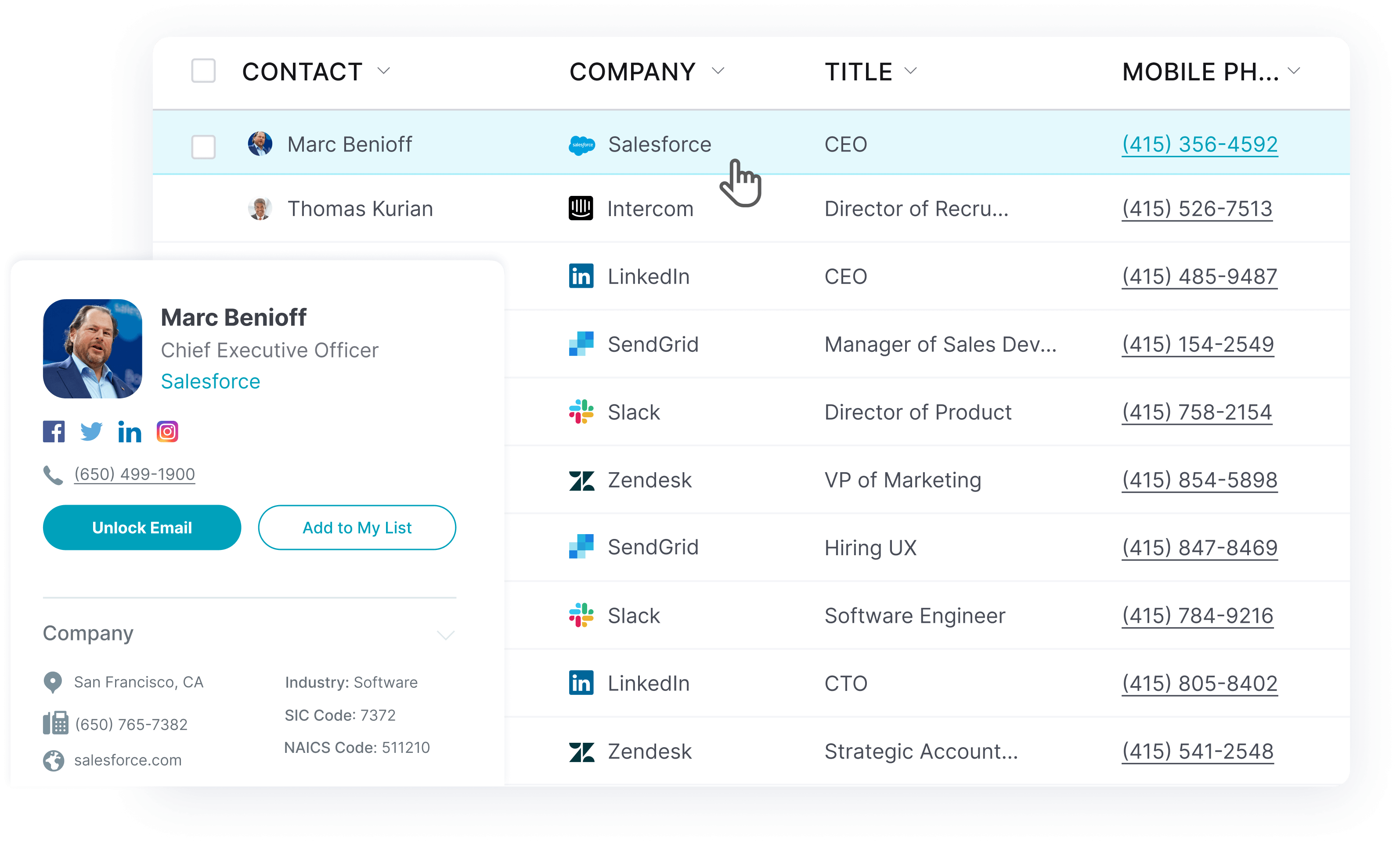
Lead411
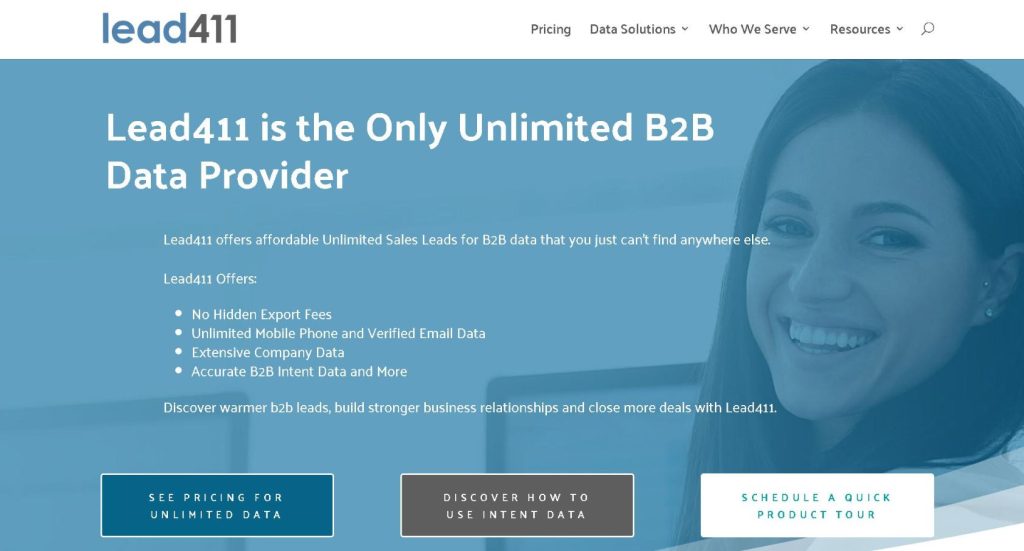
Lead411 is a B2B data provider that gives you access to an extensive database. You can filter through it with firmographic, demographic, and demographic search filters to find high-quality, targeted prospect lists.
Because of its North American focus, Lead411 is ideal for US companies. Its database features 450 million contacts, covering 20 million companies and 30K+ searchable technologies.
Lead411’s technology tracking, real-time email verification, and Bombora intent data are major selling points. However, Lead411 is largely targeted at North America, so it’s not ideal for companies outside the US and Canada.
Key Features:
- Lead scoring
- 30,000+ searchable technologies
- Bombora purchase intent data
- Real-time email verification
- Data Enrichment
- CRM integration
- Google Chrome extension
- API
Pros:
- No hidden export charges
- Double-verified phone numbers
- Integration with over 25 CRMs
Cons:
- Some outdated leads
- Has a North American focus (limited data in certain countries)
- Customer support issues
Pricing
- Free trial: $0 for 50 exports (7 days)
- Basic Plus Unlimited: $99 per user for unlimited exports per month
- Enterprise Limited: custom quote for teams
Reviews
Capterra: 4.7/5 ⭐ (61 reviews)
G2: 4.5/5 ⭐ (464 reviews)
ZoomInfo
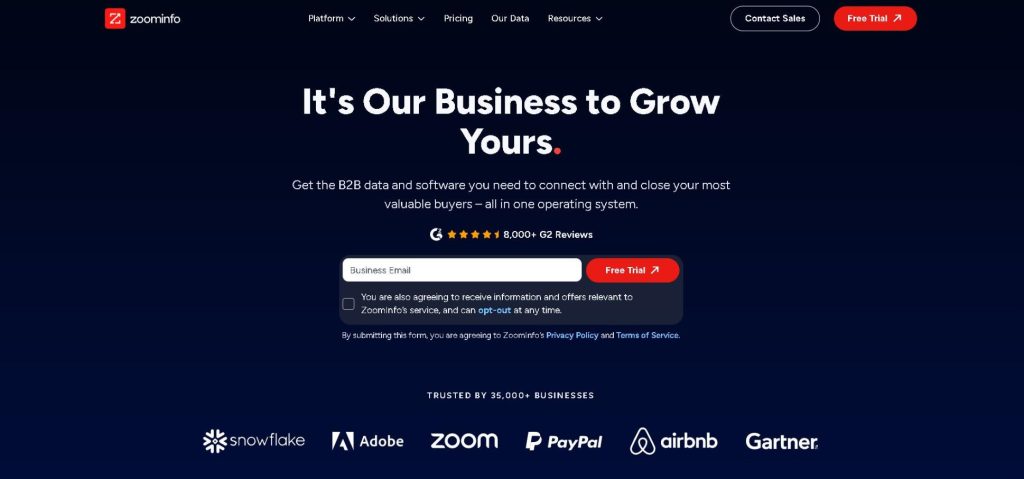
ZoomInfo is a robust B2B intelligence tool that gives you valuable features that help with lead generation. You can sift through the ZoomInfo database and use search filters to uncover quality leads and build targeted prospect lists.
Because ZoomInfo is expensive, it’s a solution for larger, enterprise-level businesses. If your company cannot afford it, look for a suitable ZoomInfo competitor. The database has over 129+ million business email addresses and 50+ million direct dials in the U.S. alone.
The database is ZoomInfo’s biggest selling point. Its biggest drawback is the price. The cheapest plan costs $15,000 per year.
Key Features:
- Lead builder
- Organizational charts
- Purchase intent data
- ZoomInfo Google Chrome extension
Pros:
- Large database with detailed contact and company data.
- Advanced search and filtering.
- Real-time intent data finds active prospects.
Cons:
- No public pricing
- Expensive
- Steep learning curve for setup.
- Free plan has very limited access
Pricing
- Professional: from $14,995/year
- Advanced: from $24,995/year
- Elite: from $39,995/year
Reviews
Capterra: 4.1/5 ⭐ (286 reviews)
G2: 4.4/ 5 ⭐ (8,439 reviews)
Lusha
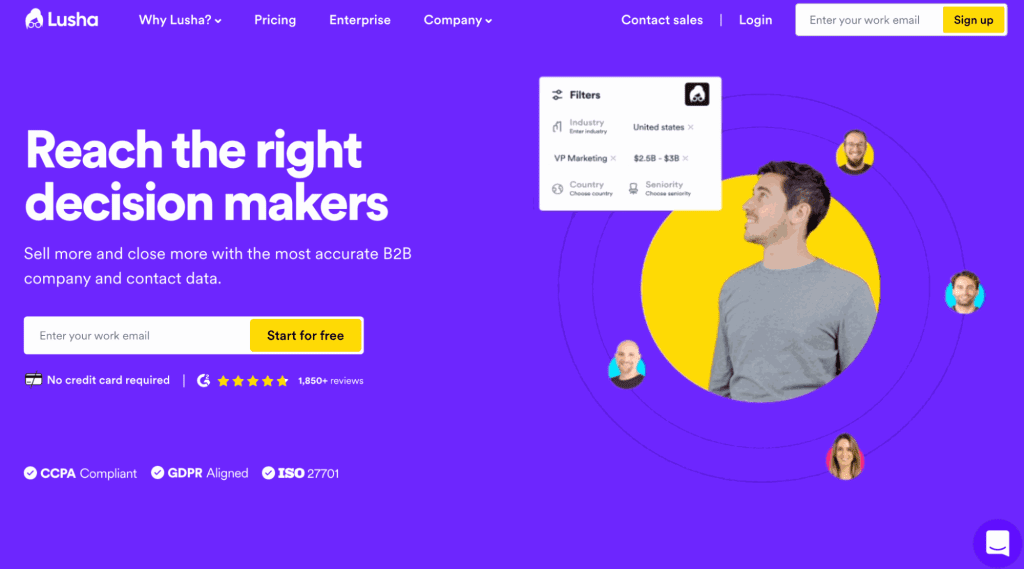
Lusha is a B2B sales and marketing tool that gives you access to its large database. The tool gives you granular targeting filters to uncover the best leads out of the 60+ million contacts. Your sales and marketing teams will benefit from the lead generation.
Lusha is best for small and medium-sized enterprises with a budget that can afford the application. The Lusha database has 100+ million business email addresses and 60+ million decision-maker contacts. There are also 15+ million full company profiles, and the data accuracy is 81%.
One of Lusha’s selling points is its competitive pricing. It’s cheaper than most competitors, coming in at a minimum price of $29 per user per month. However, its lack of features and data accuracy is a drawback.
Key Features:
- 12+ contact attributes
- 25+ company attributes
- CRM integration
Pros:
- Big database
- Affordable
Cons:
- Lacks features
- No intent data
- No email verification feature
- Data accuracy is lacking
Clearbit
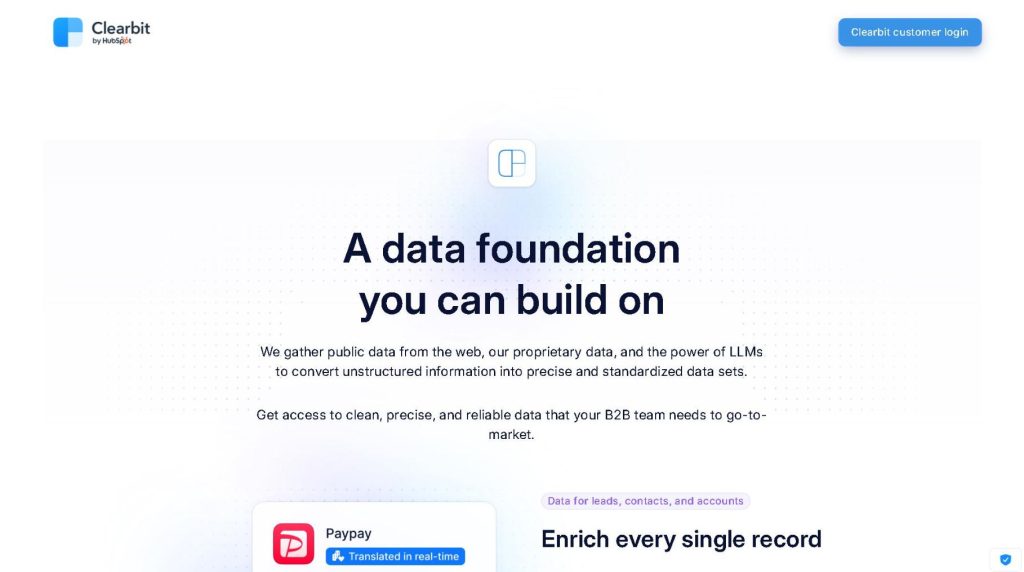
Clearbit is a B2B data provider that gives you access to its extensive database. You can use over 100+ B2B attributes to prospect for high-quality leads and build targeted contact lists. Your sales and marketing teams can target the right people at the right time and in the right way.
Clearbit is a great lead-generation solution for businesses of all industries, types, and sizes. Its large database features over 350+ million contacts from over 40+ million companies. The email validation feature is a vital feature, but pricing lacks transparency.
Key Features:
- 100+ B2B attributes
- 100+ firmographic, technographic, and demographic attributes
- Email validation
- API
- CRM integration
- Purchase intent data
Pros:
- Lots of B2B attributes
- Large database
Cons:
- Vague pricing
Pricing:
- Custom pricing
Reviews
Capterra: 4.5/5 ⭐ (33 reviews)
G2: 4.4/ 5 ⭐ (623 reviews)
UpLead is a great alternative to Clearbit if you need clear pricing structures.
Seamless AI
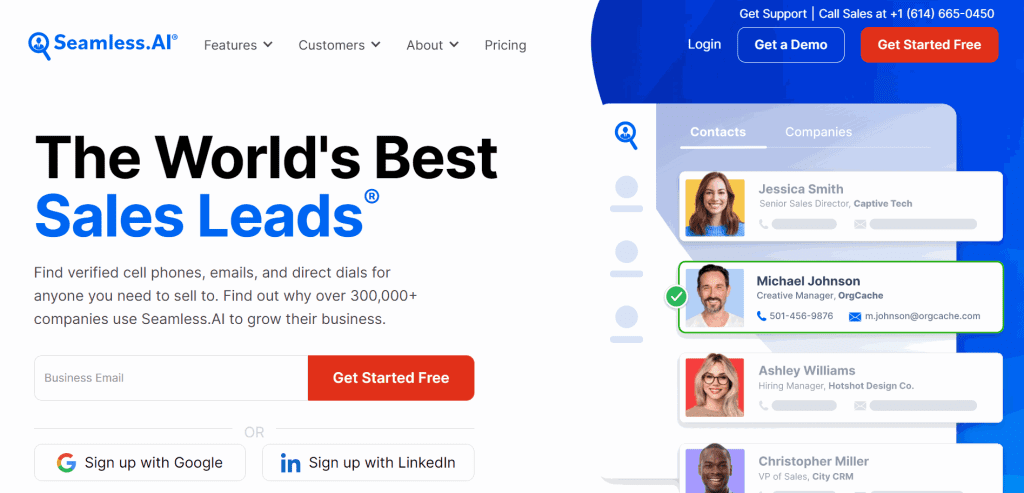
Seamless.ai is an artificial intelligence-powered search engine that finds target data in real time. With this innovative solution, you can uncover email addresses, direct dials, and cell phones for your prospects.
Seamless.ai is ideal for larger-sized enterprises that can afford the software. It doesn’t have a database or conventional features. Small and medium-sized businesses would be better off with a more standard B2B data provider.
Key Features:
- Data Enrichment
- Email verification
- Technologies search attribute filter
- Google Chrome extension
- CRM integration
Pros:
- Innovative sales and marketing intelligence tool
- Integrates with CRM platforms like Salesforce
Cons:
- Expensive compared to competitors
- Questionable data accuracy
- Frequent pricing changes cause unpredictability.
- No API
Pricing:
- Free Plan: Basic features.
- Basic: $147/month.
- Pro and Enterprise: Custom pricing based on needs.
Reviews
Capterra: 3.7/5 ⭐ (149 reviews)
G2: 4.3/ 5 ⭐ (2,675 reviews)
DiscoverOrg
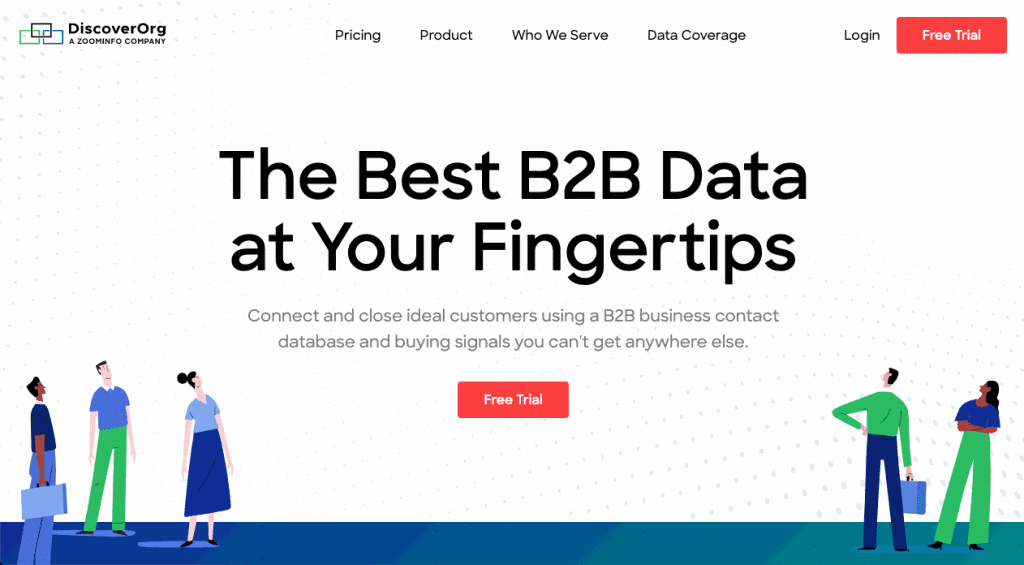
DiscoverOrg is a cloud-based B2B lead generation software that allows customers to build targeted contact lists. With DiscoverOrg, you can use search attribute filters and predictive intent data to find the best leads for your company.
DiscoverOrg is best for medium—and large-sized B2B businesses that need a lead generation solution. The DiscoverOrg database includes 300 human data researchers. These people manually review, verify, and enhance the data to meet the 95% data accuracy mark.
Although DiscoverOrg uses special features like organizational charts, it lacks pricing and database transparency.
Key Features:
- Organizational charts
- Verified direct dials
- Predictive intent data
- Granular segmentation
- 95% data accuracy
Pros:
- Data is mostly accurate
- Good intent data
Cons:
- Lack of pricing and database transparency
- Likely expensive
Pricing
Pricing is only available upon request
Reviews
Capterra: 4.1/5 ⭐ (61 reviews)
G2: – (no reviews available)
Many people analyze Discover org vs. ZoomInfo, but the companies are merged now.
Apollo
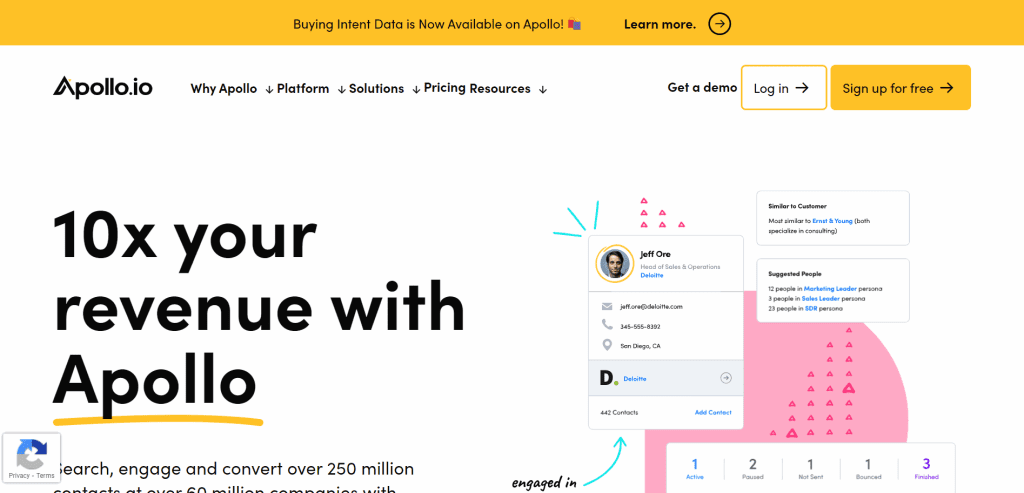
Apollo is a web-based lead generation software offering customers a large database. You can use over 200+ search attribute filters to find the best leads and create targeted prospect lists.
Apollo is ideal for SaaS platforms that want an optimal sales and marketing intelligence platform. With over 250 million contracts from 60 million companies and 120 million mobile numbers, Apollo’s database is capable.
Two standout features are the technology tracking and firmographic attributes. Apollo’s drawback is its suspect data accuracy.
Key Features:
- 200+ search attribute filters
- Technographic filters
- Firmographic filters
- LeadSift intent data
- Google Chrome extension
- CRM integration
Pros:
- Lots of search filters
- Data updated regularly for accuracy
Cons:
- Questionable data accuracy
- Complex features with a learning curve
Pricing
- Free: $0
- Basic: from $49/user/month
- Professional: from $79/user/month
- Organization: from $119/user/month
Reviews
Capterra: 4.6/5 ⭐ (344 reviews)
G2: 4.8/5 ⭐ (6,994 reviews)
If you’re looking for Apollo alternatives, look no more!
LinkedIn Sales Navigator
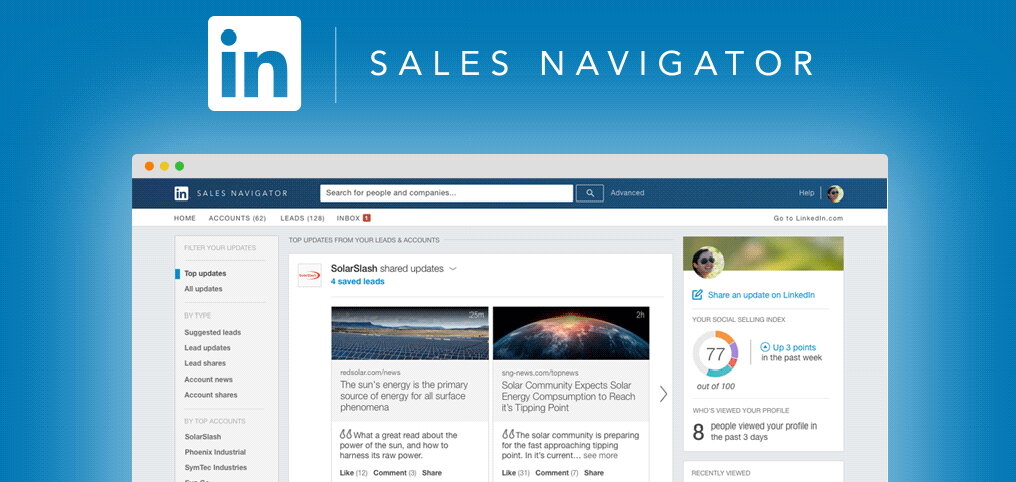
LinkedIn Sales Navigator is an automated lead generation solution that allows you to use the LinkedIn network. With the tool, you can target, understand, and engage prospects.
LinkedIn Sales Navigator uses the LinkedIn platform as its database. This includes 850+ million members, spanning 200+ countries and 58+ million companies.
Because LinkedIn Sales Navigator taps into LinkedIn, its data quality is high. However, the software lacks real-time email verification and is limited to LinkedIn. There’s no Google Chrome extension.
Key Features:
- Extended network access
- Unlimited searches
- Advanced searching filters
- Firmographic search filters
- Technographic search filters
- Intent data
- CRM integration
- API
Pros:
- Taps into the LinkedIn database
- Fantastic intent data
- Helps create genuine connections
Cons:
- Expensive
- Limited to the LinkedIn platform
- Takes time to learn and optimize
Pricing:
- Core: $99.99/user/month.
- Advanced: $169.99/user/month.
- Advanced Plus: Custom pricing.
Reviews
Capterra: 4.5/5 ⭐ (146 reviews)
G2: 4.3/5 ⭐ (1,902 reviews)
Voila Norbert
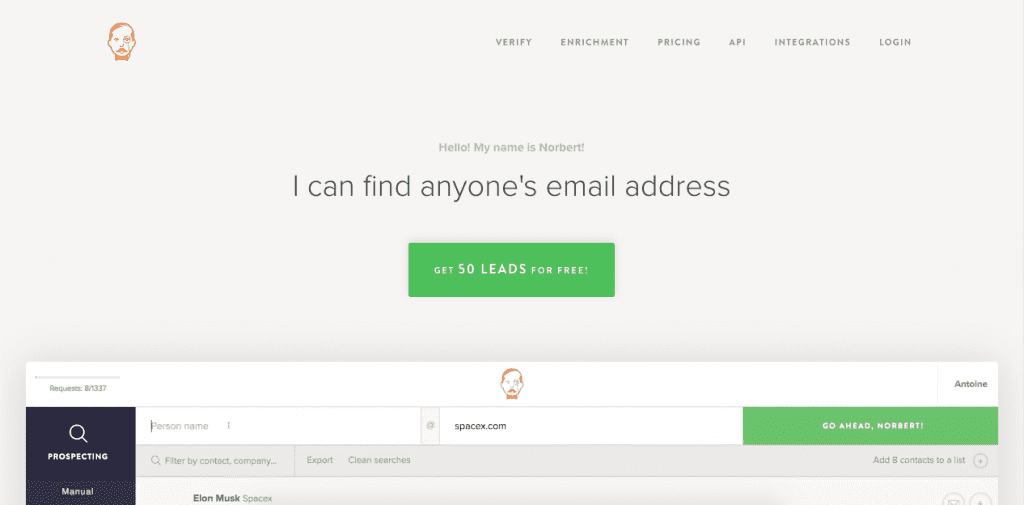
Voila Norbert is an email finder, verifier, and enrichment tool that finds email addresses. Voila Norbert will uncover a valid email address by typing in a first and last name and a company website. An 8-step email verification ensures accuracy.
Voila Norbert is a capable email prospecting tool that is ideal for companies of all types. Its database is accurate and up to date. It’s arguably the best email-finding tool on the market but it has drawbacks. You need to purchase the finder, verifier, and enrichment separately.
Key Features:
- Email finder
- Real-time email verification
- 98% email accuracy
- Lead enrichment
- Bulk actions
- Google Chrome extension
- API
- CRM and email integrations
Pros:
- Very high email accuracy
- Easy to use
Cons:
- Finder, verifier, and enrichment features come separately
- Expensive compared to competitors
- Lack of database transparency
Pricing:
- Valet: $49/month
- Butler: $99/month
- Advisor: $249/month
- Counselor: $499/month
Reviews
Capterra: 4.5/5 ⭐ (22 reviews)
G2: 4.7/5 ⭐ (61 reviews)
Adapt
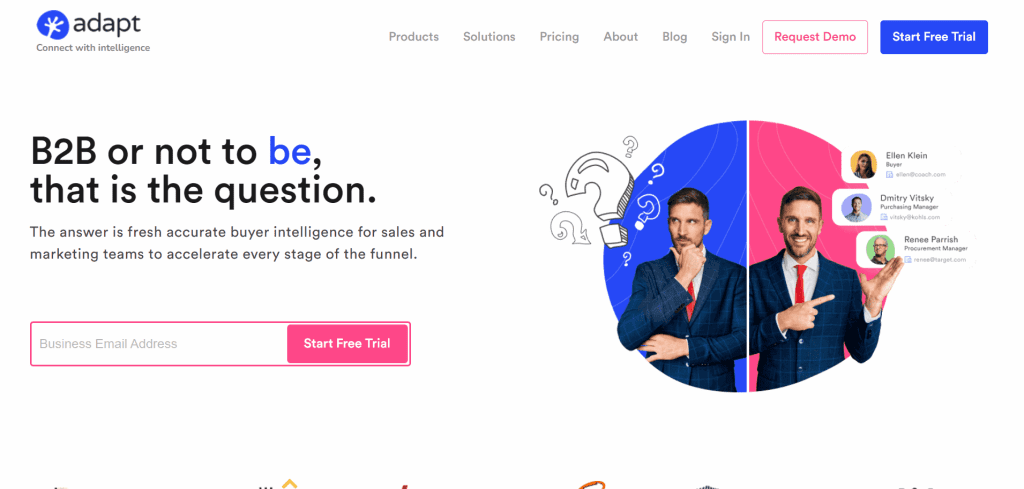
Adapt is a sales acceleration platform offering marketing and sales teams accurate buyer intelligence. You can unearth ideal prospects by using demographic and firmographic search filters.
Adapt is suitable for companies in the following industries:
- Business services
- Education
- Financial services
- Government
- Healthcare, pharmaceutical, and biotech
- Manufacturing
- Real estate and construction
- Retail
- Software and internet
- Telecommunications
The platform is easy to use, but its email data tends to have higher bounce rates. The Adapt database includes over 61+ million contacts from 25+ million companies. The database updates one million times weekly to ensure accuracy.
Key Features:
- 25+ search filters
- Firmographics attributes
- Real-time enrichment
- CRM integration
- APIs
- Google Chrome extension
Pros:
- Real-time enrichment
- Great firmographic search filters
Cons:
- Smaller database
- High email bounce rate
Pricing:
- Free: $0/month
- Starter: $49/month
- Basic: $99/month
- Custom: custom pricing
Reviews
Capterra: –
G2: 4.6/5 ⭐ (2,773 reviews)
RocketReach
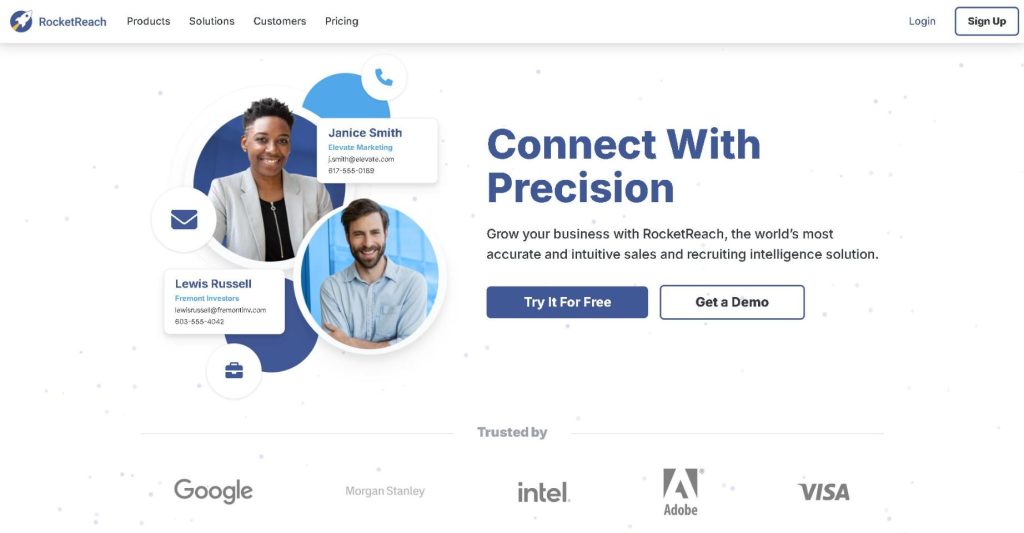
RocketReach is a sales intelligence tool that gives you access to a large contact database. Its prospecting features allow you to use search filters like demographics and firmographics to create targeted prospect lists. RocketReach is best for organizations of all uses and industries.
The RocketReach database includes 700+ million professionals from 35+ million companies worldwide. RocketReach claims data accuracy of 85% but doesn’t guarantee it. There is also no intent data or real-time email validation.
Key Features:
- Advanced search
- Search filters
- Firmographic filters
- Contact list builder
- Chrome extension
- Bulk lookups
- List generation tool
- API
- CRM Integration
Pros:
- Has a Google Chrome extension
- Lots of search filters
- Offers free features
Cons:
- No data accuracy guarantee
- Data accuracy is lower than that of competitors
- Negative customer service reviews
Pricing
- Free: $0
- Essentials: from $39 per month
- Pro: from $99 per month
- Ultimate: from $249 per month
Reviews
Capterra: 4.2/5 ⭐ (131 reviews)
G2: 4.5/ 5 ⭐ (755 reviews)
Lead Genius
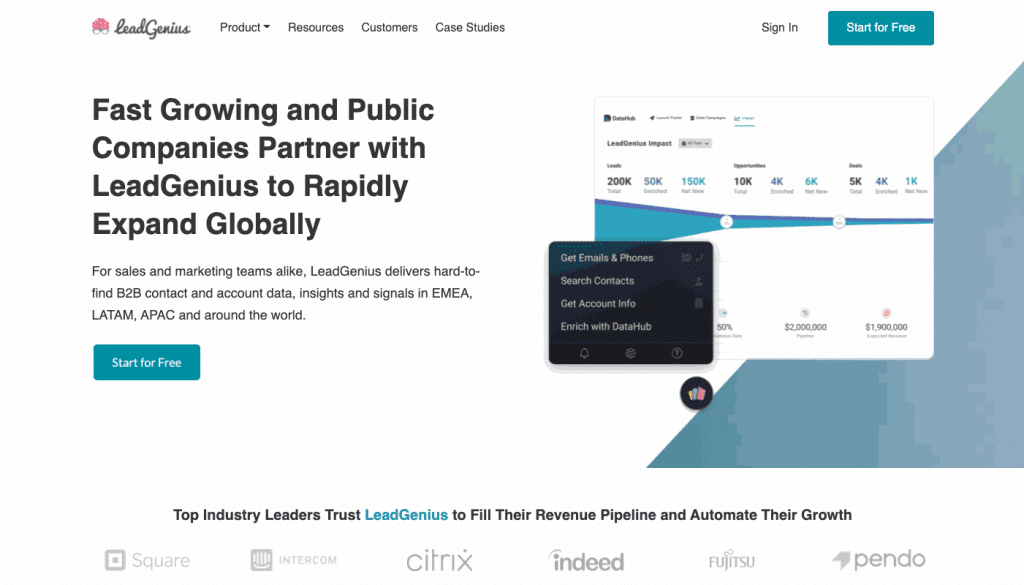
LeadGenius is a B2B lead generation tool that helps businesses grow with data-driven marketing and sales strategies. It combines B2B data, data outsourcing, and robotic process automation to create the ultimate growth automation solution.
LeadGenius is ideal for mid-sized and large businesses that want to outsource lead generation. Brands like Rakuten, Amazon, Intercom, Square, PFL, and Indeed use it.
LeadGenius taps into global contact and account datasets from several sources. It covers Latin America, Asia and the Pacific, Europe, The Middle East, Africa, America, Australia, and New Zealand.
Key Features:
- Vertical datasets
- Account and contact intelligence
- Hyper-specific personas
- Global data coverage
- Buying intent signals
- Custom Data API
- Custom Signals API
Pros:
Here are some of the pros of LeadGenius:
- Has a large database
- Innovative tool
Cons:
Here are some of the cons of LeadGenius:
- Not as many conventional features
- Higher price than the industry standard
Pricing:
- Custom quote upon request
Reviews
Capterra: 4.5/5 ⭐ (3 reviews)
G2: 4.3/ 5 ⭐ (14 reviews)
How to Choose the Best B2B Data Provider For Your Team
Most B2B data providers build their databases with technology that crawls the internet and social media. Contact data is acquired from multiple sources, such as LinkedIn profiles, company websites, press releases, and public social media feeds.
You’ll find that most of them use the same methods and technologies to accomplish this.
However, the quality of B2B data providers varies for several reasons. Some have better data and verification processes, while others have more useful prospecting and enrichment features. You need to know what to look for and what red flags to avoid.
You should consider several B2B data provider elements to find the best fit for your company. We’ve listed three of the most important ones below.
Database Size & Quality
A B2B data provider is only as good as its database. When considering the best B2B data provider, make sure to research each candidate’s database. You should find out the following:
- The amount of data in the database
- The quality of the data in the database
- The type of data in the database
The size of a database is important: a larger pool of data means more potential leads. No, size isn’t everything, but having more contact and company information is a plus. Make sure to find out what exactly the size of the database is made up of. There can be deceptive numbers here.
The quality of a database must also be observed. A smaller, more accurate database is better than a larger, inaccurate one. B2B data that isn’t accurate is worthless and has no potential value to you as a lead. Some providers might still charge you for accessing inaccurate data.
Your B2B data provider should have a strong data accuracy figure. For example, UpLead guarantees 95% data accuracy. Many B2B data providers lack transparency in this department, which is a major red flag.
Lastly, you must consider the type of data in the database. There are five types of B2B data:
- Demographic data
- Firmographic data
- Technographic data
- Chronographic data
- Intent data
This is information about employees, companies, technologies used by companies, the historical activity of companies, and real-time activity. These attributes are important and will provide value to your sales and marketing teams.
Not every B2B data provider will offer all five of these data types. When looking for the ideal provider, consider what data they have and don’t have.
Usability
B2B data providers use web-based software to allow you access to their databases. These programs can often be tricky to navigate and learn. Even the best app can fail if it’s hard to use.
You should be able to use one of these tools with ease. Look for providers with an intuitive user interface that doesn’t require much onboarding or training.
Budget
The first factor you need to consider is price. If one of the applications listed in this article is out of your budget, you can disqualify it from consideration. Some ZoomInfo competitors offer affordable entry plans, while others don’t.
One of the most important elements you must consider is price. If a B2B data provider is too expensive for your budget, then you can remove it from consideration. Price varies a lot: ZoomInfo starts at $15,000 per year, while UpLead costs as little as $99 monthly.
Why Should I Use a B2B Data List Provider?
Using a B2B data provider can give you an edge in today’s data driven market for lead generation, sales strategies and targeted marketing. Here’s how:
- Improved Lead Generation: Enriched databases help you find better quality leads faster.
- Better Timing for Sales Sales trigger events and intent data so you can reach out at the right time.
- Targeted Marketing: Company data and contact information for personalized account based marketing.
- Lead Scoring: Intent data and customer behaviour analysis to qualify and prioritise leads.
- Data Enrichment: Providers fill in the gaps and update your database for accuracy and relevance.
- Predictive Analytics: Market trends and customer behaviour to forecast future opportunities.
- Higher Conversion Rates: More accurate targeting means more effective sales and marketing.
What Types of Data Do B2B Data Companies Offer?
B2B data providers offer different data types; company, customcer and real-time data.
1. Company Data
- Company Specific Data: Information about a company’s structure, key decision makers and financials.
- Firmographic Data: Company related attributes such as industry, size, revenue and growth trends.
- Technographic Data: Information about the technology stack or software a company uses.
- Geographic Data: Location based data so you can target specific regions or areas.
2. Customer Data
- Demographic Data: Information about individuals within a company, age, gender, job role and education.
- Psychographic Data: Information about the values, motivations and behaviours of decision makers or employees.
- Behavioral Data: Tracks the actions and interactions of customers, online engagement or purchase history.
- Intent Data: Reveals a buyer’s intent to buy, often based on behavioural signals and online activity.
3. Real-Time and Event Triggered Data
- Sales Trigger Events: Key business events like mergers, funding rounds or leadership changes that indicate sales opportunities.
- Real-Time Data Enrichment: Live updates to existing data, appending or correcting information about companies or contacts.
FAQs About Company Data Providers
A B2B data provider is a company that sells access to its database of business information. This data includes information about companies, employees, and key organization decision-makers.
A B2B database platform is a software application that hosts a provider’s digital contact database and program. These platforms are cloud-based, running on a web application that operates over the internet.
B2B data (business-to-business data) is information about B2B companies. It’s information about businesses that sell to other businesses, like industrial suppliers. B2B data helps marketing and sales teams target the right prospects at the right time and in the right way. It ensures that their strategies and campaigns are data-driven without wasting time and resources.
B2B data comes from public and private sources on the Internet and social media, such as LinkedIn pages, company websites, press releases, articles, and social media feeds.
What You Need to Remember About B2B Data Providers
This article covered 14 B2B data providers that can skyrocket your outreach efforts. These lead prospecting tools give you access to large contact databases. You can create targeted prospect lists that your sales and marketing teams can use to grow.

